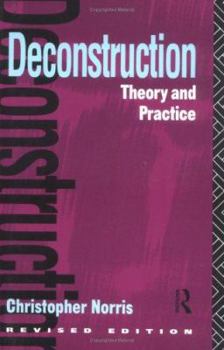Book Overview
Deconstruction: Theory and Practice has been acclaimed as by far the most readable, concise and authoritative guide to this topic. Without oversimplifying or glossing over the challenges, Norris makes... This description may be from another edition of this product.
Format:Paperback
Language:English
ISBN:0415061741
ISBN13:9780415061742
Release Date:August 1991
Publisher:Routledge
Length:196 Pages
Weight:0.95 lbs.
Dimensions:0.7" x 5.1" x 7.8"
Customer Reviews
3 ratings
The best intro to deconstruction in English
Published by Thriftbooks.com User , 19 years ago
This book provides an excellent introduction to deconstruction in general, as well as to Derrida, the major philosophical figure of the late Twentieth Century. Norris is one of the foremost authorities on Derrida and deconstruction in the English-speaking world, and he writes with great insight. This is emphatically not a lightweight work, although most of it is not beyond the ability of the average literate reader. Much of it is brilliantly written and illuminating. I came away from this book with a pretty good grasp of what deconstruction involves, and the significance of Derrida as a writer and thinker. For anyone interested in the evolution of literary theory over the last century, beginning with the old "new criticism", structuralism, and then post-structuralism, this book presents an excellent and lucid explanation of all these movements, and the major figures in them: F.R. Leavis, Saussure, Barthes, Derrida, de Man, among others. Norris is completely sympathetic in his treatment of deconstruction; there is no Anglo-American analytic bias against it present anywhere. The understanding is deep, and the writing is (mostly) clear and lucid. The pages devoted to de Man were quite opaque to me, however. (But then, de Man is probably opaque to most everyone, Norris excepted.) In the concluding chapter Norris gives an account of those who have tried to counter deconstruction's influence on the American scene. Norris contends that deconstruction is an important method which has raised genuine and vitally important issues which cannot be lightly dismissed. To do so is to fail to confront it on its own ground.
And A Supplement!
Published by Thriftbooks.com User , 20 years ago
As lucid and concise an exposition as you are likely to find on Derrida and deconstruction. Norris covers an amazing amount of material in this brief book, mostly chronologically (the Sophists put in an appearance along with, of course, fairly extensive treatment of Nietzsche and Heidegger) though with occasionally necessary digressions. Derrida's central concept (to speak metaphysically) of 'supplementarity' is clearly explained, and the sections on Paul De Man and his 'theory of rhetoric' are especially good. Norris goes to great pains to distinguish 'philosophical' deconstruction from the more stylistically 'literary' varieties as propagated by Geoffrey Hartman, J Hillis Miller et al. While clearly sympathetic - - even at times somewhat defensive - - toward deconstruction, Norris is very even-handed in his treatment of the subject, originally concluding the book with a chapter on 'Dissenting Voices' such as John Ellis' cogently-articulated AGAINST DECONSTRUCTION. Originally published in 1982, this later edition has a supplementary (!) 'Afterword' in which Norris mitigates some of his (as he would have it) understatements on speech-act theory and the misunderstandings over what deconstruction 'really' does; that is, the differences between post-modern 'destructive' and 'deconstructive' performance and criticism, using source materials throughout to bolster his points.
Great Summary
Published by Thriftbooks.com User , 24 years ago
While you won't fully understand what is going on in deconstructionism after reading this book, you'll probably be closer than most. Deconstructionism is probably the most misunderstood "thing" around. Norris provides an incredibly fair and balanced presentation of the basic issues and main misreadings of the people involved. If you want a basic overview of what is going on that doesn't attempt to reduce everything to pragmatism or relativism, then this is the place to start. This was the first book that made me go, "ah, I at least understand what the problems are."My only complaint is that I wish Norris spent more time on Heidegger and the roots of deconstructionism. However given how complex Heidegger is, this is understandable. After reading Norris I'd suggest going back to something like _Between the Blinds: A Derrida Reader_. He'll make a whole lot more sense after reading Norris.





